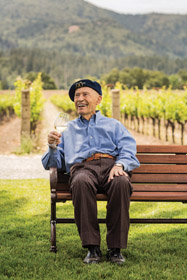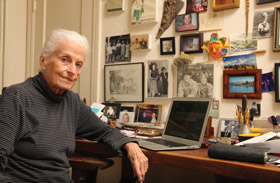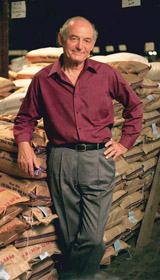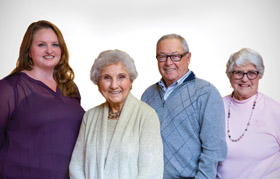Three North Bay leaders attribute their passions for post-retirement work as the cause of their unfaltering energy and continued service in the careers they spent a lifetime perfecting.
We all want the secrets to a long, healthy and happy life. But in the search for the latest breakthroughs on diet and exercise, how often do we think of the role that work can play in our well-being? Here are three individuals who continue to contribute, create and give back into their 80s and 90s through work that’s deeply meaningful to them. They generously agreed to share what keeps them working so hard, the unexpected rewards they’ve found and what they’d still like to achieve.
Mike Grgich: Bringing success to his family
 Miljenko “Mike” Grgich, the proprietor, winemaker, president and CEO of Grgich Hills Estate in Rutherford, has a story to tell about his first taste of success in business, and it has nothing to do with the 1976 “Judgment of Paris”, when the Chardonnay he made for Chateau Montelena famously beat out the best French white wines in a blind tasting by the world’s top wine judges.
Miljenko “Mike” Grgich, the proprietor, winemaker, president and CEO of Grgich Hills Estate in Rutherford, has a story to tell about his first taste of success in business, and it has nothing to do with the 1976 “Judgment of Paris”, when the Chardonnay he made for Chateau Montelena famously beat out the best French white wines in a blind tasting by the world’s top wine judges.As a 6-year-old boy in his native Croatia, Grgich was responsible for bringing 20 sheep into the mountains before school, returning to round them up and get them safely home at dusk. It was his first job, and he took the responsibility very seriously.
“I learned from my young days to need success," he remembers. "That was my success then: to bring my sheep home happy and to know that from the sheep would come the wool, the milk, the manure and the lambs, and that, as a little guy, I was contributing to the family.”
At 92, Grgich is still working every day to bring success to his family. He keeps no set hours, making himself available to do whatever is needed. He’s in contact daily with his daughter, Violet Grgich, the winery’s vice president of operations and sales, and nephew, Ivo Jeramaz, the vice president of vineyards and production. Doctor’s appointments take up more of his time than they used to nowadays, but he still prefers to be at the winery every day, greeting visitors and signing bottles from a chair in the tasting room.
“I have four things that keep me going,” he shares. “First is God; second is love; third is wine; and fourth is friends. There are many more, but those are my four essential reasons to be active and participate in life.”
Grgich has experienced the highest levels of professional success as winemaker at wineries like Souverain, Beaulieu vineyard, Robert Mondavi and Chateau Montelena, and presiding over Grgich Hills Estate Winery since 1977. This success let him give back in ways that were unimaginable to him as a child. He brought Roots of Peace, an organization dedicated to removing landmines, into his native Croatia after the war in the 1990s (See “People You Should Know: Heidi Kuhn,” Special Wine Issue 2015). He also founded a winery in Croatia to share improved methods of wine production with local vintners and donated $1 million to the University of Zagreb for winemaking scholarships.
Back in Napa Valley, he’s deeply involved in Hospice of Napa Valley, Clinic Ole in Napa and funds the American Dream scholarship through the James Beard Foundation, among many other philanthropic deeds. He describes these gifts as not only part of what keeps him healthy, but also what keeps him happy.
With his eyes twinkling and his trademark beret firmly in place, Grgich speaks excitedly of what the future holds. A book he wrote about his life and achievements, A Glass Full of Miracles, will be published in 2016, and he’s participating in a new documentary, The Judgment of Paris, about the 1976 tasting that changed the world’s perception of Napa Valley wines and gave new hope to winemakers around the world.
“I don’t like to just sit down and slowly die,” he says. “I want to live as long as I can. Many politicians, when they want to be reelected, they chant, ‘Four more years!’ I’m 92 and I’m chanting, ‘Eight more years!’”
Ann Brebner: Life imitates art
 As a girl in New Zealand, playwright and director Ann Brebner (now of San Rafael) fell in love with the theater when her best friend’s mother would let the girls tag along while she did theatrical work. After studying directing at the prestigious Old Vic Theatre in London, she eventually landed in Marin County. Since then, her creative career has made an indelible mark on the community and, at 92 years young, she’s hard at work on her next play.
As a girl in New Zealand, playwright and director Ann Brebner (now of San Rafael) fell in love with the theater when her best friend’s mother would let the girls tag along while she did theatrical work. After studying directing at the prestigious Old Vic Theatre in London, she eventually landed in Marin County. Since then, her creative career has made an indelible mark on the community and, at 92 years young, she’s hard at work on her next play.Brebner found her career path early, but much like a play, it’s contained several acts. In 1961, after finding few options for theater work in her new surroundings, she and her then-husband founded the original Marin Shakespeare Company in Ross. She went on to found the Brebner Agencies in San Francisco, representing actors and screenwriters while working as a casting agent for commercials and films. After many years of success with the agency, she sold it and transitioned into consulting one-on-one with actors, helping them work through their auditioning and performance roadblocks.
Brebner decided to collect those experiences into a book, Freeing the Actor Within. It came out in 1990, when she was 67, and started a whole new phase of her career. She was suddenly in demand as a speaker all over the United States and Canada, all while continuing to write and direct plays here and in New York.
“I think it’s possible, in the arts in general, to not retire,” says Brebner. “You don’t suddenly stop painting. You do have to stop dancing at a certain point, but you can teach or create choreography.”
Part of Brebner’s ability to keep moving her career forward can be credited to a willingness to say yes to opportunities, whether they were in the plans or not, and to create opportunities when there were none. She describes being able to see the end result she’s aiming for clearly, then working backward to figure out the steps needed to get there, whether she’s directing a play or raising money to start a theater company.
“I think getting to do what you intuitively want to do makes life simple in some ways,” she says. “Difficult in a practical sense, sometimes, but decision making is straightforward.”
Brebner was a leading force in the creation of the Christopher B. Smith Rafael Film Center, which opened in downtown San Rafael in 1999. Today, she’s especially proud of the center’s programs for children, such as classes where kids learn to make films about their own lives.
In 2004, Brebner co-directed the play “Sex Parasite” with Frances Lee McCain as part of San Rafael’s Alter Theater inaugural season. She continues to write and direct with Alter Theater, with her latest work, “Land of the Endless White Cloud,” set in her native New Zealand, currently in development.
“I haven’t stopped directing yet,” she says. “Some people don’t love the thought of a 92-year-old director. I think younger producers don’t see older directors as cutting edge. They perceive them as being rooted in the past whereas the theater—and art, in general—is always moving forward. But I’ve moved so far from where I started, in my head, my heart and in my experience. It’s taken me to a completely different place in the last 70 years.”
Lou Bertolini: A credit to his community
 In 1967, when Lou Bertolini opened Western Farm Center in Santa Rosa with his brother, Larry, he probably had no idea it would stand as an institution in the community for more than 48 years. The store, which bills itself as “the farm in the city,” sells hay, seeds, beekeeping supplies, pet food and so much more to generations of Sonoma County farmers and urban gardeners.
In 1967, when Lou Bertolini opened Western Farm Center in Santa Rosa with his brother, Larry, he probably had no idea it would stand as an institution in the community for more than 48 years. The store, which bills itself as “the farm in the city,” sells hay, seeds, beekeeping supplies, pet food and so much more to generations of Sonoma County farmers and urban gardeners.At 84, you can still find Bertolini in the office nearly every day of the week, working a few hours each morning and afternoon with a few hours off in between. His busiest days are the weekends, when most of the office staff is gone and he can catch up on paperwork and occasionally support employees with questions on egg incubators or other specialized equipment.
"I like to do it because I know everything that’s going on this way," says Bertolini. "When I’m asked a question, I can answer it readily."
That work ethic goes back to growing up on a ranch in Santa Rosa, where tending the vegetable garden was a 24/7 family affair. He started to pick up odd jobs at 15, setting pins at the local bowling alley and collecting garbage one bag at a time. Bertolini’s father had to partially retire at 50 due to injuries sustained during World War I, but the octogenarian learned from his father, other relatives and neighbors the importance of hard work.
“Most of those old timers didn’t know how to quit working,” he says. “It was instilled in them. They had to work because they didn’t know anything else—and their wives wanted them out of the house anyway.”
Bertolini says he recognizes this same work ethic all around him today, particularly in the many immigrant families struggling and doing everything they can to make a living. He remembers that he and his brother (who passed away in 2012) first felt their business was a success when they could hire people and give them good jobs with good benefits.
“I felt that if we couldn’t be of service, there was no sense in being in business,” says Bertolini. “We knew what it was like working for just wages and nothing else, and so we wanted to be better than that.”
He credits a weekly foursome of golf, his indoor bicycle and heading up and down the stairs at work with his physical health, but just as important is having something to get up and look forward to each day.
“You have to try to get involved in something, not necessarily in a business if you retired,” he advises. “Our bodies are made of muscle and blood. It has to stay active, and the mind has to stay active. You have to get out and do things, as much as you can physically do, and make it become a passion.”
In his work and in his life, Bertolini continues to share what he’s learned over the years and give back to the community he calls home. He knows that every generation “thinks it invented the wheel” but, in fact, the value of working hard and helping others never changes.
“I think what I’ve really enjoyed more than anything is having the ability to give to organizations, like The Children’s Village and Kid’s Street Learning Center,” he says. “It makes me feel really good that everything I’ve done to build this and be successful means that I’m able to give back what I remember would have been nice to have as a kid.”
More than work
One thing these three all have in common is a desire to pass on what they’ve learned to the next generation, and they’re able to do that through the work they love.
“I’m still the captain of the ship at 92 because I have more experience than anybody else,” says Grgich emphatically. “I believe that lots of good experience is lost if people quit.”
They also seem to live by a different definition of work, not as a place to go from 9 a.m. to 5 p.m. but as a purpose and passion woven into every day of their lives. There may well be no easy answers on how to live a long, purposeful life, but if you spend it doing something that brings you great satisfaction, whatever years you get will be well spent.
“I can’t conceive of a life where I didn’t do what I love doing,” says Brebner. “It’s my work, but it’s far more than work. I don’t regard it as work, I regard it as life.”
Experience Wanted
 Have you come to a point in your life when full-time work, even work you love, isn’t what you want or need anymore, but the idea of perpetual retirement bores the socks off you? If you’re willing to share the skills you’ve spent your career building, there’s no shortage of nonprofit organizations who’d love to put you to work.
Have you come to a point in your life when full-time work, even work you love, isn’t what you want or need anymore, but the idea of perpetual retirement bores the socks off you? If you’re willing to share the skills you’ve spent your career building, there’s no shortage of nonprofit organizations who’d love to put you to work.The Volunteer Center of Sonoma County coordinates several programs that match retired or semi-retired volunteers with service positions to fit their talents and interests. RSVP is a national program aimed at getting those age 55 and older out into the community to serve. There are now more than 800 people in the program in Sonoma County alone, many of whom have volunteered for decades. In 2014, the center introduced another program, Expertise Exchange, to engage volunteers with specialized skills in providing more strategic help to the nonprofit community.
“For Expertise Exchange, I sit down with a nonprofit’s executive director, talk about what its challenges are and find the areas where a volunteer could come in and give some advice,” says Donata Mikulik, the center’s volunteer and community services manager. “Then I match it up with a volunteer who has the background and the skills needed and they spend about three months together addressing those challenges.”
At the end of the three months, the volunteer presents the organization with defined deliverables, such as how to create and implement a new strategic plan or how to rework the organization’s messaging to be clearer to stakeholders.
“We try to make it project-oriented, with a specific timeline and a clearly-defined outcome,” says Mikulik.
The contributions of all of these retired or semi-retired volunteers are essential components of the North Bay’s thriving nonprofit community. For people like Henry Lasky of Petaluma, the skills he honed as a federal administrative law judge have led him to donate his skills to groups like the Coalition for the Prevention of Elder Abuse, the Task Force for Palliative Care and Sonoma County Area Agency on Aging, among many others.
“Everything in my career, from being a lawyer to a judge to a mediator, involved conflict resolution, so it was easy to get involved in volunteer work that required those skills,” says Lasky.
At 80, he also makes time to do things that bring personal satisfaction, like his weekly visits to a 93-year-old blind woman who lives in an assisted living facility, which says he enjoys as much as she does.
“I was brought up that you always give back,” he adds. “I find it fulfilling to do so.”
Barbara Londerville of Santa Rosa, 87, a former computer engineer with Pacific Bell, now works 20 to 30 hours per week serving the community on a volunteer basis. She handles data input for the United Way, counts money for the Volunteer Center’s Volunteer Wheels program and is a reading tutor for first graders in local schools.
“It gets me out of the house.” she explains. “Many older people, especially widows, tend to stay home. They were used to going out mostly with their husbands, and it’s easy to become a recluse like that.”
Mary Liberatore of Santa Rosa remembers first volunteering as a teenager, helping the war effort during World War II by training as a nurse’s aide in a local hospital and preparing snacks for USO guests. Now 89 years old, she’s spent the last 15 years volunteering with the Santa Rosa Police Department and the Wells Fargo Center for the Arts, as well as several years with the Volunteer Center’s literacy program. A lifetime of volunteering has done just as much good for her as it has for her those around her.
“The ability to volunteer throughout my life has attributed to my longevity, dedication to the community, and a sense of well-being of mind, body and soul,” says Liberatore.
For more information
Volunteer Center of Sonoma County: www.volunteernow.com
Center for Volunteer & Nonprofit Leadership: www.cvnl.org (Marin and Napa counties)



